《Frightening nature》典型教学设计研究论文
- 格式:doc
- 大小:26.50 KB
- 文档页数:6
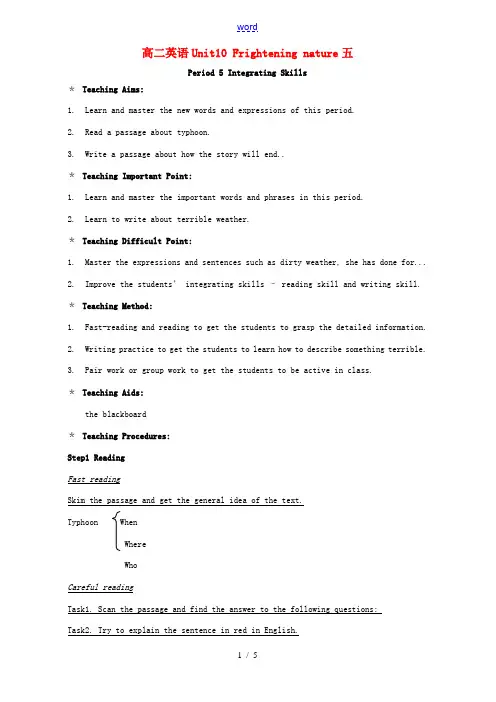
高二英语Unit10 Frightening nature五Period 5 Integrating Skills*Teaching Aims:1.Learn and master the new words and expressions of this period.2.Read a passage about typhoon.3.Write a passage about how the story will end..*Teaching Important Point:1.Learn and master the important words and phrases in this period.2.Learn to write about terrible weather.*Teaching Difficult Point:1.Master the expressions and sentences such as dirty weather, she has done for...2.Improve the students’ integrating skills – reading skill and writing skill. *Teaching Method:1.Fast-reading and reading to get the students to grasp the detailed information.2.Writing practice to get the students to learn how to describe something terrible.3.Pair work or group work to get the students to be active in class.*Teaching Aids:the blackboard*Teaching Procedures:Step1 ReadingFast readingSkim the passage and get the general idea of the text.Typhoon WhenWhereWhoCareful readingTask1. Scan the passage and find the answer to the following questions:Task2. Try to explain the sentence in red in English.1.Where did the ship meet the typhoon?The Nansan met the typhoon on her way from south to Fuzhou. Maybe it was on the westPacific Ocean.2.What was the weather at first?It was fine, for there was no wind and the heat was close.=There’s no freely moving air and it was stuffy and hot.3. Why did the capital say that it looked as if a typhoon was ing on?Because he observed the barometer fell and he knew that a terrible storm would e soon.=saw that the figure on the barometer became lower .4. Where were they when the full force of the hurricane struck the ship?When the hurricane struck the ship with full force, they were all on the bridge.The bridge: It was a higher position on the ship.5. What should they do in such terrible weather?They could only move the ship over the high sea and into the very eye of the wind.high sea : wild/stormy seathe eye of the wind: the center of the storm6.What does the sentence “ Anothe r one like this, and that’s the last of her” mean?It means that if another white tower of water struck the ship, it would sink.7. Why did the capital strike a match? What did he see?Because there was no light and the capital wanted to see the barometer. He saw thebarometer stood very low. It was the lowest reading he had ever seen in his life. Heknew that the worst was to e yet.reading: a figure shown by a measuring instrument.It was the lowest figure shown on the barometer he had ever seen.Task3.T or F questions.1. A steamship called Nanshan was sailing for the province of Fujian from the south.2. It was fine in the morning although there was some wind.3. The engineer Jukes predicted that there was some dirty weather knocking about.4. Captain MacWhirr and Mr. Jukes were on the bridge when the full force of the hurricane struck the ship.5. All of them were sure that the storm had been over because there was no wind all of a sudden.6. The lowest reading on the barometer meant the worst storm was to e.T F F T F TStep 2 Language Points1.on board = in or on ( a ship, an aircraft or public vehicle)eg. 1) Have the passengers gone on board yet?2) 一上船,我总想吐。
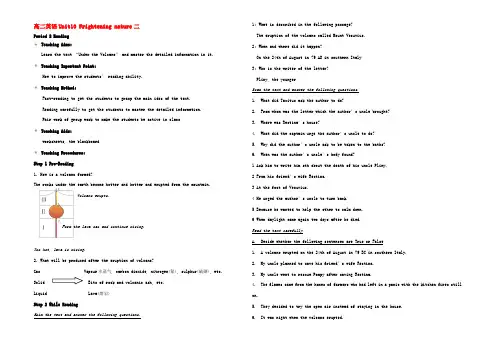
高二英语Unit10 Frightening nature二Period 2 Reading*Teaching Aims:Learn the text “Under the Volcano” and master the detailed information in it.*Teaching Important Point:How to improve the students’ reading ability.*Teaching Method:Fast-reading to get the students to grasp the main ides of the text.Reading carefully to get the students to master the detailed information.Pair work of group work to make the students be active in class*Teaching Aids:worksheets, the blackboard*Teaching Procedures:Step 1 Pre-Reading1. How is a volcano formed?The rocks under the earth become hotter and hotter and erupted from the mountain.Volcano erupts.Form the lava sac and continue rising.Too hot, lava is rising.2. What will be produced after the eruption of volcano?Gas Vapour水蒸气, carbon dioxide, nitrogen(氮), sulphur(硫磺), etc. Solid Bits of rock and volcanic ash, etc.Liquid Lava(熔岩)Step 2 While ReadingSkim the text and answer the following questions. 1: What is described in the following passage?The eruption of the volcano called Mount Vesuvius.2: When and where did it happen?On the 24th of August in 79 AD in southern Italy3: Who is the writer of the letter?Pliny, the youngerScan the text and answer the following questions.1.What did Tacitus ask the author to do?2.From whom was the letter which the author’s uncle brought?3.Where was Rectina’s house?4.What did the captain urge the author’s uncle to do?5.Why did the author’s uncle ask to be taken to the baths?6.When was the author’s uncle’s body found?1 Ask him to write him sth about the death of his uncle Pliny.2 From his friend’s wife Rectina.3 At the foot of Vesuvius.4 He urged the author’s uncle to turn back.5 Because he wanted to help the other to calm down.6 When daylight came again two days after he died.Read the text carefullyA. Decide whether the following sentences are True or False1. A volcano erupted on the 24th of August in 79 BC in southern Italy.2.My uncle planned to save his friend’s wife Rectina.3.My uncle went to rescue Pompy after saving Rectina.4.The flames came from the homes of farmers who had left in a panic with the kitchen fires still on.5.They decided to try the open air instead of staying in the house.6.It was night when the volcano erupted.f f t f t fB, Fill in the chat of “The eruption of Mount Vesuvius”C. Divide the letter into several parts and find out the main idea for each part. Part one(par._1_): The purpose of writing the letter Part two(par._2_):when and where the disaster happened Part three(par._3-6_): What Pliny’s uncle do in the … Part four(par._7_):Conclusion of the letterD. Arrange the following statements in the right order according to the text. 1. He decided to rescue his friend Pompy.2. Some people watched an unusual cloud rising from a mountain.3. Rectina begged him to save her.4. He ordered a boat made ready.5. Two slaves helped him stand up and immediately he fell down dead.6. He bathed and had dinner.7. A rain of rocks was coming down. 2431675Step 3 Post-Reading1. From the text, we can learn that Tacitus____ A. Was a history writer B. Worked for the local policeC. Was a close friend of PlinyD. Did research into volcanoes and earthquakesA Para1. I hope you can use it for the history book that you are writing.(推断题) 2.What is the passage mainly about? A.The death of Pliny the elderC The possible causes of volcanoes eruptingD The ways of escaping from a volcano eruption3.“The sight of it awoke the scientist in my uncle to go and see it from closer at hand.”The underlined parts refer to______A.Mount Vesuvius; the uncle of the writerB. A mountain in the distance;Pliny the elderC. A cloud of unusual size and shape;qualities of a scientist like curiosityD.dark spots of dirt and ash;qualities of a scientist like curiosity C awake sth. in sb. 唤起某人的……4.The writer didn’t think his uncle was afraid on the trip to Vesuvius because______ A. he had to rescue his friend’s wife Rectina B. he hurried to a place from which others were fleeing C. He had a good knowledge of how to survive a volcano eruption5.Pompy didn’t get away because___ A.He had to wait for a good wind B.there was no way out except by boat C.he was too scared to take any actionD.he wanted to join Pliny in observing the eruptionA Para5. He had to wait for a good wind, blowing the other way than the one that carried my uncle right in.( 细节题)6.____ led to the imm ediate death of the writer’s uncle.A. The wrong decision he madeB. His interest to study the volcanoC.That he didn’t take the eruption seriously7.What does the writer mean with the last sentence of the letter?A.It is no easy task to be a history writerB.He reminds Tacitus of his uncle’s braveryC.He is sorry that he can’t tell Tacitus more about the eruptionStep 4 HomeworkFind out the difficult sentences and new expressions in the text。
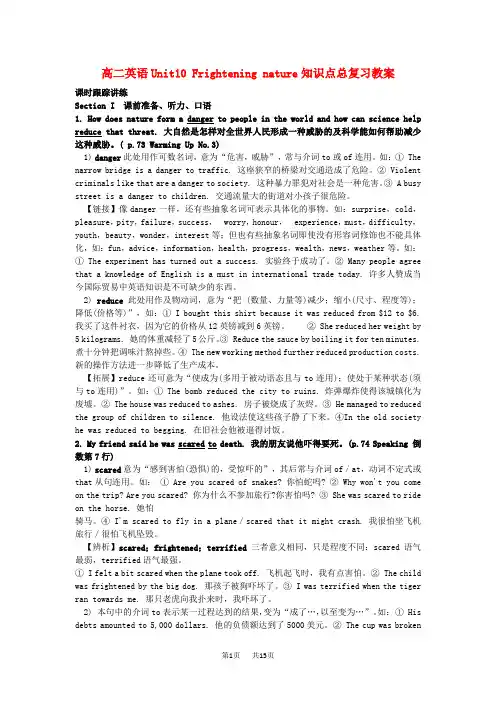
高二英语Unit10 Frightening nature知识点总复习教案课时跟踪讲练Section I 课前准备、听力、口语1. How does nature form a danger to people in the world and how can science help reduce that threat. 大自然是怎样对全世界人民形成一种威胁的及科学能如何帮助减少这种威胁。
( p.73 Warming Up No.3)1) danger此处用作可数名词,意为“危害,威胁”,常与介词to或of连用。
如:① The narrow bridge is a danger to traffic. 这座狭窄的桥梁对交通造成了危险。
② Violent criminals like that are a danger to society. 这种暴力罪犯对社会是一种危害。
③ A busy street is a danger to children. 交通流量大的街道对小孩子很危险。
【链接】像danger一样,还有些抽象名词可表示具体化的事物。
如:surprise,cold,pleasure,pity,failure,success, worry,honour, experience,must,difficulty,youth,beauty,wonder,interest等;但也有些抽象名词即使没有形容词修饰也不能具体化,如:fun,advice,information,health,progress,wealth,news,weather等。
如:① The experiment has turned out a success. 实验终于成功了。
② Many people agree that a knowledge of English is a must in international trade today. 许多人赞成当今国际贸易中英语知识是不可缺少的东西。
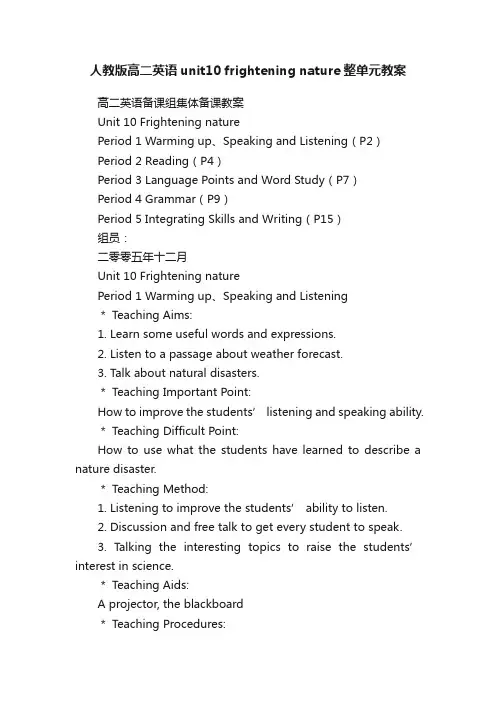
人教版高二英语unit10 frightening nature整单元教案高二英语备课组集体备课教案Unit 10 Frightening naturePeriod 1 Warming up、Speaking and Listening(P2)Period 2 Reading(P4)Period 3 Language Points and Word Study(P7)Period 4 Grammar(P9)Period 5 Integrating Skills and Writing(P15)组员:二零零五年十二月Unit 10 Frightening naturePeriod 1 Warming up、Speaking and Listening* Teaching Aims:1. Learn some useful words and expressions.2. Listen to a passage about weather forecast.3. Talk about natural disasters.* Teaching Important Point:How to improve the students’ listening and speaking ability.* Teaching Difficult Point:How to use what the students have learned to describe a nature disaster.* Teaching Method:1. Listening to improve the students’ ability to listen.2. Discussion and free talk to get every student to speak.3. Talking the interesting topics to raise the students’ interest in science.* Teaching Aids:A projector, the blackboard* Teaching Procedures:Step 1 Warming upLet’s talk about the pictures!geologyBranches of science biologymeteorologyastronomyothersDiscussionT: Look at the first picture. What do we call the study of the earth?S: Geology.T: What do we call the scientists who do research work in geology?S: Geologists.T: What do geologists observe and what scientific instruments do they need to carry out their research work?S: ….Geology* The study of the earth is called geology, dealing with the history of our planet, volcanoes, earth-quakes, and stones and minerals. Instruments which are used are seismographs, thermometers, microscopes, etc.Meteorology** Meteorology is the study of the climate and weather on earth as well as natural phenomena such as hurricanes, typhoons, rain and snow fall, sunshine, droughts, etc. Instruments that are usually used are thermometers, barometers, instruments to measure wind speed and rainfall.Astronomy*** The study of the universe is astronomy, which deals withthe history of the universe and what is found in it (stars, planets, the sun, the moon, blank holes, etc). Instruments are telescopes, satellites and radio telescopes.Biology**** Biology is the study of nature, which deals with all living things in nature on our planet, including organisms that cause diseases both in humans and animals and crops. Instruments that are used are micro-scopes, etc.Step 2 Speaking1. Listen to the tape , then answer the questions .(1) When did typhoon happen?(2) What happened to tops of trees?(3) Where did sand and wood sweep up into?(4) Did typhoon pull the roofs off the house?2. Some set phrases and sentences:move in circles be frighteningget into a total panic be scared to deathgo up pull….. Off make one’s hair stand on end3. Useful Expressions* How terrible! * I dare not…. * He gets into a total panic when…. * It makes my hair stand on end. * It’s a frightening thing….* She’s scared to death. * It makes me feel very worried. * I’m afraid of …. * I’m frightened to death by….*I’m really frightened to….*What’s really scary is….*What terrified me is….Step3 Listening1 What is the listening text about?It is about the weather in the USA.2 What do we call this type of radio message?A weather forecast.3 Listen to the tape again and answer the following questions.① How should you prepare for the day if you go fishing in the Great Lake region?You should have to bring warm clothes but not too warm; you may still need to take a raincoat or at least an umbrella, although you may not need them.② In whic h part of the USA should car drivers be careful?All along the northeastern coast from the Northeast to the South, roads may become dangerous with rain, wet snow and strong winds.③ What happens when a hurricane hits the coast?If a hurricane hits the coast it can be a real disaster.④ Which letter would the name for the sixth hurricane in 2005 begin with?The name of the sixth hurricane could begin with the letter “F” e.g. Flora or Frank.Step 4 HomeworkWrite down the dialogue on the exercise books and preview the reading text.Unit 10 Frightening naturePeriod 2 Reading* Teaching Aims:Learn the text “Under the Volcano” and master the detailed information in it.* Teaching Important Point:How to improve the students’ reading ability.* Teaching Method:Fast-reading to get the students to grasp the main ides of the text.Reading carefully to get the students to master the detailed information.Pair work of group work to make the students be active in class* Teaching Aids:worksheets, the blackboard* Teaching Procedures:Step 1 Pre-Reading1. How is a volcano formed?The rocks under the earth become hotter and hotter and erupted from the mountain.Volcano erupts.Form the lava sac and continue rising.Too hot, lava is rising.2. What will be produced after the eruption of volcano?Gas Vapour水蒸气, carbon dioxide, nitrogen(氮), sulphur(硫磺), etc.Solid Bits of rock and volcanic ash, etc.Liquid Lava(熔岩)Step 2 While ReadingSkim the text and answer the following questions.1: What is described in the following passage?The eruption of the volcano called Mount Vesuvius.2: When and where did it happen?On the 24th of August in 79 AD in southern Italy3: Who is the writer of the letter?Pliny, the youngerScan the text and answer the following questions.1. What did Tacitus ask the author to do?2. From whom was the letter which the author’s uncle brought?3. Where was Rectina’s house?4. What did the captain urge the author’s uncle to do?5. Why did the author’s uncle ask to be taken to the baths?6. When was the author’s uncle’s body found?1 Ask him to write him sth about the death of his uncle Pliny.2 From his friend’s wife Rectina.3 At the foot of Vesuvius.4 He urged the author’s uncle to turn back.5 Because he wanted to help the other to calm down.6 When daylight came again two days after he died.Read the text carefullyA. Decide whether the following sentences are True or False1. A volcano erupted on the 24th of August in 79 BC in southern Italy.2. My uncle planned to save his friend’s wife Rectina.3. My uncle went to rescue Pompy after saving Rectina.4. The flames came from the homes of farmers who had left in a panic with the kitchen fires still on.5. They decided to try the open air instead of staying in the house.6. It was night when the volcano erupted.f f t f t fB, Fill in the chat of “The eruption of Mount Vesuvius”Time What happenedon the 24th of Aug. in 79AD, between 2 & 3p.m. a cloud rose from the mountainafterwards some of the cloud was white and darkafter dinner broad sheets of flame were lighting up many parts of Vesuviusthe next day shower of rock, darknessC. Divide the letter into several parts and find out the mainidea for each part.Part one(par._1_): The purpose of writing the letterPart two(par._2_):when and where the disaster happenedPart three(par._3-6_): What Pliny’s uncle do in the …Part four(par._7_):Conclusion of the letterD. Arrange the following statements in the right order according to the text.1. He decided to rescue his friend Pompy.2. Some people watched an unusual cloud rising from a mountain.3. Rectina begged him to save her.4. He ordered a boat made ready.5. Two slaves helped him stand up and immediately he fell down dead.6. He bathed and had dinner.7. A rain of rocks was coming down.2431675Step 3 Post-Reading1. From the text, we can learn that Tacitus____A. Was a history writerB. Worked for the local policeC. Was a close friend of PlinyD. Did research into volcanoes and earthquakesA Para1. I hope you can use it for the history book that you are writing.(推断题)2.What is the passage mainly about?A.The death of Pliny the elderB The eruption of Mount Vesuvius in 79 ADC The possible causes of volcanoes eruptingD The ways of escaping from a volcano eruption3.“The sight of it awoke the sc ientist in my uncle to go and see it from closer at hand.”The underlined parts refer to______A.Mount Vesuvius; the uncle of the writerB. A mountain in the distance;Pliny the elderC. A cloud of unusual size and shape;qualities of a scientist like curiosityD.dark spots of dirt and ash;qualities of a scientist like curiosityC awake sth. in sb. 唤起某人的……4.The writer didn’t think his uncle was afraid on the trip to Vesuvius because______A. he had to rescue his friend’s wife RectinaB. he hurried to a place from which others were fleeingC. He had a good knowledge of how to survive a volcano eruptionD.he was calm enough to write a report about what he observedPara. 3 last sentence5.Pompy didn’t get away because___A.He had to wait for a good windB.there was no way out except by boatC.he was too scared to take any actionD.he wanted to join Pliny in observing the eruptionA Para5. He had to wait for a good wind, blowing the other way than the one that carried my uncle right in.( 细节题)6.____ led to the immed iate death of the writer’s uncle.A. The wrong decision he madeB. His interest to study the volcanoC.That he didn’t take the eruption seriouslyD. that he wanted to rescue Pompy after rescuing Rectina Para 4.7.What does the writer mean with the last sentence of the letter?A.It is no easy task to be a history writerB.He reminds Tacitus of his uncle’s braveryC.He is sorry that he can’t tell Tacitus more about the eruptionD.He leaves it for Tacitus to decide which parts are important for his history bookStep 4 HomeworkFind out the difficult sentences and new expressions in the textUnit 10 Frightening naturePeriod 3 Language Points and Word Study* Teaching Aims:Learn some useful words and expressions.* Teaching Important Point:Learn and master the important words and phrases in this period.* Teaching Difficult Point:How to master the important language points in the passage.* Teaching Method:Explanation to help Ss master some language points.* Teaching Aids:the blackboard* Teaching Procedures:Step 1 GreetingsGreet the whole class as usualStep 2 RevisionRevise the passage by listening or giving a summary.Step 3 Language points:1. threat[Wret] n.恐吓, 威胁;迹象, (坏)兆头a threat against sb.'s life. 对某人生命的威胁The threat of flood has been relieved. 洪水的威胁解除了。
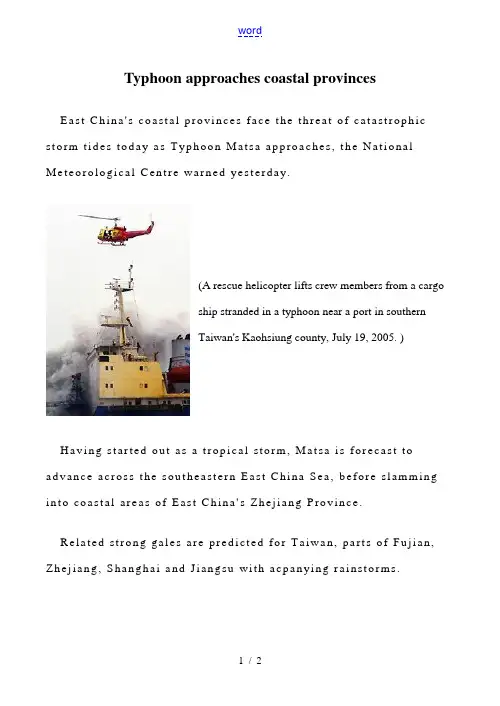
Typhoon approaches coastal provincesE a s t C h i n a's c o as t al p r ovi n c es f a c e t he t h r e at o f c at a s t rop hi cs t o rm t i d es t o d a y a s T yp h o o n M a t s a ap p ro a c he s, t h e N at i o n alM e t e o ro l o gi c al C ent r e w a rn e d ye s t e r day.(A rescue helicopter lifts crew members from a cargoship stranded in a typhoon near a port in southernTaiwan's Kaohsiung county, July 19, 2005. )H a vi n g s t ar t e d o ut a s a t r op i c a l st o rm, M at s a i s fo r e c as t t oa d v an c e a c r os s t h e s ou t h e as t er n E as t C hi na S e a,b e f or e sl am m i n g i nt o co a st al ar e a s of E ast C hi n a's Zh ej i a n g P ro vi nc e.R el a t e d st ro n g ga l es a r e pr e di ct e d fo r T a i w a n, p a rt s o f F uj i a n, Zh e j i a n g, S h an gh a i a nd J i an gsu wi t h ac p a n yi n g r a i ns t o rm s."C o as t al a ut h o ri t i es s ho ul d b e w e l l p re p a r ed fo r t h e t yp h o o n as i t c o ul d bi n e wi t h a l o c a l s p ri n g t i d e t o c a u s e i n c re a s ed d ev a st at i o n," t h e c en t re w ar n ed.F o l l ow i n g t h e do wn p ou rs e ar l i e r t hi s w e e k, t o rr e nt i a l r ai n s wi l lc o nt i nu e t o l a sh ei gh t p r ovi n c es a c r oss No rt h e ast, C e nt r al and E as t C hi na, i n cl ud i n g pa r t s o f Li a on i n g, S h a nd on g,An hui, J i a n gs u,J i an gx i, H un a n a n d Zh e j i an g."In t h e n ex t t h re e da ys,d a m a ge i s l i kel y t o b e c a us e d b y w e a t h e r i n cl u di n g l i gh t ni n g, t hu nd e r, ha i l s t o rm s a nd gal e s,"a s po k es m a ns a i d.H o w ev e r, t h e r ai n fa l l wi l l be n e fi t s om e ar e a s pl a gu ed by t h ep e r s i s t ent h e at wa ve i n t h e S o ut h a nd p r ol o n ge d d ro u ght i n t h eN o rt h.A f t e r hot an d st u f fy w e a t h e r a c r os s C e n t r a l C hi n a an d p ar t s ofE a st C hi na, d o wn po u rs s i n c e W ed n es da y h a v e p us h ed t h e m e r cu r y t o b e l o w 35 C i n m a ny c i t i es i n c l u di n g B e i j i n g.。
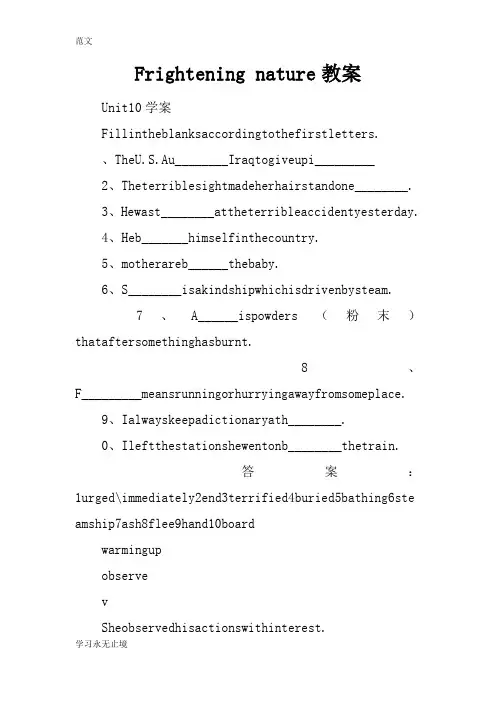
Frightening nature教案Unit10学案Fillintheblanksaccordingtothefirstletters.、TheU.S.Au________Iraqtogiveupi_________2、Theterriblesightmadeherhairstandone________.3、Hewast________attheterribleaccidentyesterday.4、Heb_______himselfinthecountry.5、motherareb______thebaby.6、S________isakindshipwhichisdrivenbysteam.7、A______ispowders(粉末)thataftersomethinghasburnt.8、F_________meansrunningorhurryingawayfromsomeplace.9、Ialwayskeepadictionaryath________.0、Ileftthestationshewentonb________thetrain.答案:1urged\immediately2end3terrified4buried5bathing6ste amship7ash8flee9hand10boardwarmingupobservevSheobservedhisactionswithinterest.Hisneighborobservedathiefclimbingoutoftheofhishouse.Thethiefwasobservedtoenterthebank.Heobservedthatithadsuddenlygrownmuchcold.2dangern抽象名词表示具体化事物,surprisecoldpleasurepityfailureworrysuccesshonorbeautywonde rinterestknowledge.Abusystreetisadangertochildren.comparison①Heisindanger②Heisdangerous.eg:onewaytounderstandthousandsofnewwordsistogain___ ____goodknowledgeofbasicwordformation.A./B.thec.aD.one3threatncarryoutathreattosb扬言要做某事beathreattosb’slifethreatenvtthreatentodosththreatensbtodosththreatensbwithdeathTherewasthe__________oftyphoon.Americanactions_________worldpeace.Thethief_______himnottocryforhelp.Hethreatenedmewithagun.Theythreatenedthattheywouldmakeitpublic.4reducevThecompanyhasreducedthepriceby10percent.Iboughtthisshirtbecauseitwasreducedfrom﹩20to﹩10.n:reduction:atareductionof10percentmakeareductionListening5hit①Theareausedtobehitbyflood.②Apowerfulearthquakehitthesmallcity.③Thedeathofhissonhittheoldmanhard.④johnhithisheadon\againstthedoor.⑤Tomhithimonthenose.⑥Hehitjohnintheface.6Ifrainisexpected,write“yes”.Ifnot,write“no”.这是一个省略句完整的句子应为:Ifrainisexpected,write “yes”.Ifrainisnotexpected,write“no”.Speaking7knowaboutknowofknow①Ihappenedtoknowabouthim.②whoknowsaboutitbutme.③Idon’tknowmr.SmithbutIknowofhim.④Heisknown_______afairjudge.⑤Hangzhouisknown_______thewestLake.⑥Hernameisknown______everyonenow.8bescared\frightenedtodeath①Areyouscaredofsnakes?②Shewasscaredtoflyinaplane.9frighteningV-ing用作形容词译为“令人…”V-ed用作形容词译为“某人感到…”eg:excitinginterestingdisappointingpuzzlingsurprisi ngastonishingshockingmovingencouragingboringdelightinginspiringpleasingworrying写出这些词相对应的过去分词型形容词:eg:mr.Smith,_____ofthe_____speech,staredtoreadanove l.AtiredboringBtiringboredctiredboredDtiringboring0destroyvtdamageruin①Thefiredestroyedthewholeforest.②Allmyhopesweredestroyedbyhisletterofrefusal.③Thewholecitywasdestroyedintheearthquake.④Thebuswasbadlydamagedwhenithitthewall.⑤Havensmokingruinedhishealth.1goup①Everythingseemstobegoingupthesedays.②Newbuildingsaregoingupeverywhere.2onend①Theterriblesightmadeherhairstandonend.②Hesatthereforhoursonend.练习:.Theteacher_______someofthestudentsreadingnovel sinclass,A.lookedB.staredc.observedD.listened2.oh,john.________yougiveus.A.HowapleasantsurpriseB.Howpleasantsurprisec.whatapleasantsurpriseD.whatpleasantsurprise3.Thedriverreducedthespeed____20mphbecauseofthedog.A.forB.byc.toD.at4.Thetyphoonwill_____theeastcoastofourcountrysoon.A.beatB.knockc.hitnd5.I______it,butIdon’t______it.A.know;knowofB.know;knowc.knowabout;knowD.knowof;knowabout6.Travelingis_____,butweoftenfeel____whenwearebackf romtravels.A.interesting;tiringB.interesting;tiringc.interesting;tiredD.interested;tired7Thefilmwasso_____thatallofuswere____tears.A.movedmovingB.moving;movingc.moving;movedD.moved;moved8.modernindustrialdevelopmenthasalmost____thenatura lenvironmentinsomeway,whichthehumanmustrelyon.A.damagedB.lostc.destroyedD.harmed9.Theboy_____attheterriblesight.A.scaredB.frightenedc.wasscaredD.wasafraid0.whenheheardthestoryofthehero,marywasmoved____tear s.A.atB.byc.toD.with1Inthatcountry,becauseoffailureofcropsthepriceofwhe atis_____daily.A.goingdownB.goingunderc.goingupD.goingover2.canyoumakeaneggstand______?A.totheendB.inendc.onendD.attheend答案:1—12ccccccccccccReadingsouthsouthernsouthwardsoutherly(1)SouthAfricaSouthernAfricaEastchinaEasternpartofchina(2)Thehousefacesthe________.Thewindowfaces________.Thesoutherlyairstreamwillbringrain.theSouthPole2draw/catch/attract/callone’sattention callone’sattentiontosthgive/payattentiontosth.devoteone’sattentiontowithattentionbringsthtoone’sattention使某人注意某事。
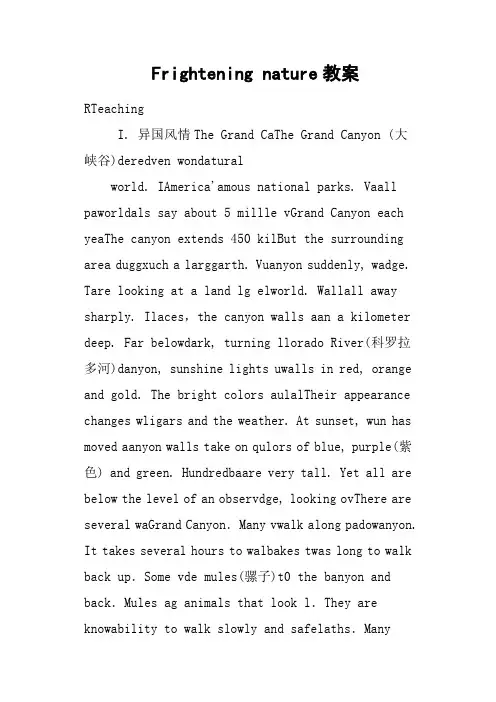
Frightening nature教案RTeachingI. 异国风情The Grand CaThe Grand Canyon (大峡谷)deredven wondaturalworld. IAmerica'amous national parks. Vaall paworldals say about 5 millle vGrand Canyon each yeaThe canyon extends 450 kilBut the surrounding area duggxuch a larggarth. Vuanyon suddenly, wadge. Tare looking at a land lg elworld. Wallall away sharply. Ilaces,the canyon walls aan a kilometer deep. Far belowdark, turning llorado River(科罗拉多河)danyon, sunshine lights uwalls in red, orange and gold. The bright colors aulalTheir appearance changes wligars and the weather. At sunset, wun has moved aanyon walls take on qulors of blue, purple(紫色) and green. Hundredbaare very tall. Yet all are below the level of an observdge, looking ovThere are several waGrand Canyon.Many vwalk along padowanyon. It takes several hours to walbakes twas long to walk back up.Some vde mules(骡子)t0 the banyon and back.Mules ag animals that look l.They are knowability to walk slowly and safelaths.ManypeoplGrand Canyon by air.They pay a helairplane pilot to fly them above and around the canyon.lorado River.They ride boats ovast moving water.Tan lawweeks.America's National Park Servargg the Grand Caany visitors.Vust carry a11 waste materials ouarea.All rocks.al objects,plants and wildlife must be left untouched.The National Park Service tells its visitors,“Take only photographs.Leave onl.”2.The BAn IslandSurtsey was b.It was a great ev.They were lucky enougbvolcanic island.It began at 7:30 a.m.November.A fishing boat was sailing near Iceland.The boat moved undaptain's feet.Hd a strange smell.He saw some bla.A volcano was erupting.The bgrey Atlantic was open.Red—,flames and smoke were rushing up from a spla-bed.The island grew quickly.It was 10gxt day and60gNovember.lew to Reykjavik to watch.It was very exciting.Smoke and flames were still rushing up.Pd—were flyingair and fallinga.The sea wasboiling and there was a strange ligurtsey grew and grew.Td in June 1967.It wagh and 2 killong.And life was already coming to Surtsey.ds came ova. Plants grew.Birds came.built a house.They waarn abouung island.A new island is like a new world.Ⅱ.知识归纳l. urge的用法(1)urge常作及物动词,意为:推进,极力主张,强烈要求,催促,劝,激励,怂恿,强调。
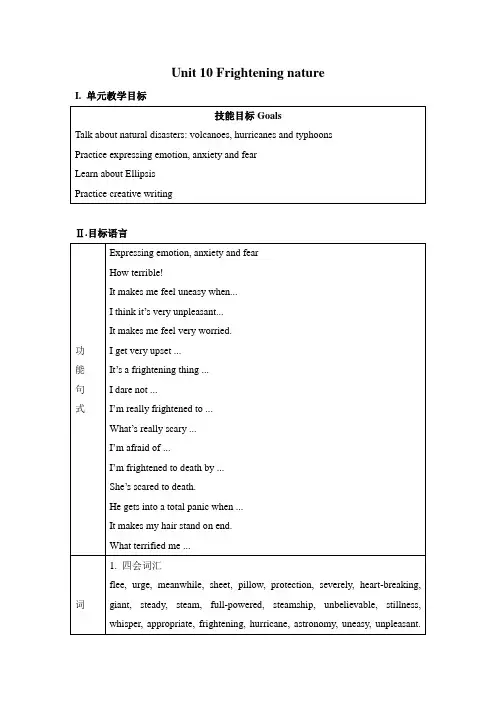
Unit 10 Frightening nature I. 单元教学目标Ⅱ.目标语言II. 教材分析与教材重组1. 教材分析本单元以frightening nature为话题,旨在通过单元教学,使学生了解各种自然灾害:地震、台风、火山喷发等,能用所学的有关自然灾害的词汇描述各种自然灾害,并学会使用表达忧虑、恐惧的词句表达自己的感受。
1.1 WARMING UP 提供了四幅有关natural history的图片:Geology(地质学),Meteorology(气象学),Astronomy(天文学),Biology(生物学),让学生根据自己的理解讨论这四个学科通常涉及的内容,并分别举例说明每个学科的重要性。
1.2 LISTENING是收音机播放的美国各州天气预报。
其中有各种天气情况的表达方式和各州的名称。
要求学生们听后与同伴合作播报一个中国各省的天气预报。
1.3 SPEAKING 根据材料,两个人合作,参照Example谈论Typhoon,之后尝试谈论75页六幅图片中的情景如何让你感到恐惧,并说明理由;同时谈论你所认识的人当中谁害怕这些以及他们对这些情景的行为反应。
1.4 PRE-READING是READING的热身活动。
它要求采用与同学讨论交流的方式谈论火山等自然灾害对人类和周围环境造成的毁坏。
1.5 READING是一封书信。
信中介绍了Pliny在火山喷发中的经历。
1.6 POST-READING 第一题中要求指出文中the one, the other, their, they等词指代什么,这就要求充分理解上下文和单词所在句子。
第二题、第三题要求从文中找到相关V olcano, Seeing和Fear的词语组成词语网络,目的在于丰富描述这些场景的词汇,为写作作好铺垫。
第四题要求从文中找到三个事例说明叔叔不惧怕火山。
第五题要求按照时间顺序复述短文。
目的:培养学生的综合信息、组织语言的能力和表达能力。
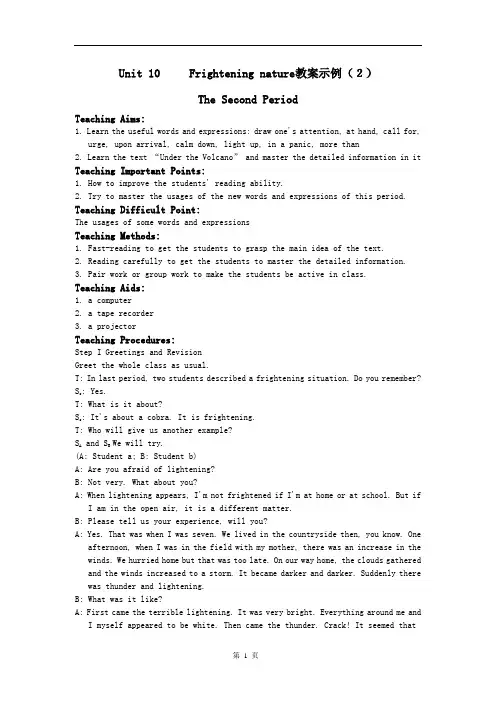
Unit 10 Frightening nature教案示例(2)The Second PeriodTeaching Aims:1. Learn the useful words and expressions: draw one's attention, at hand, call for, urge, upon arrival, calm down, light up, in a panic, more than2. Learn the text “Under the Volcano” and master the detailed information in it Teaching Important Points:1. How to improve the students' reading ability.2. Try to master the usages of the new words and expressions of this period. Teaching Difficult Point:The usages of some words and expressionsTeaching Methods:1. Fast-reading to get the students to grasp the main idea of the text.2. Reading carefully to get the students to master the detailed information.3. Pair work or group work to make the students be active in class.Teaching Aids:1. a computer2. a tape recorder3. a projectorTeaching Procedures:Step I Greetings and RevisionGreet the whole class as usual.T: In last period, two students described a frightening situation. Do you remember? S s: Yes.T: What is it about?S s: It's about a cobra. It is frightening.T: Who will give us another example?S A and S B We will try.(A: Student a; B: Student b)A: Are you afraid of lightening?B: Not very. What about you?A: When lightening appears, I'm not frightened if I'm at home or at school. But ifI am in the open air, it is a different matter.B: Please tell us your experience, will you?A: Yes. That was when I was seven. We lived in the countryside then, you know. One afternoon, when I was in the field with my mother, there was an increase in the winds. We hurried home but that was too late. On our way home, the clouds gathered and the winds increased to a storm. It became darker and darker. Suddenly there was thunder and lightening.B: What was it like?A: First came the terrible lightening. It was very bright. Everything around me andI myself appeared to be white. Then came the thunder. Crack! It seemed thatsomething exploded. That's the terrible sound I've ever heard. I was frightened to death and threw myself into my mother's arms. She got into a total panic.Carrying me on her back, she ran as fast as she could. Later, we heard that the lightening struck a tall tree and some of the branches burnt.B: That's terrible. I'm frightened to hear that.Step II Pre-readingT: Please open your books at Page 75, Pre-reading. Read the information in Part 1 and have a discussion with your partner. Then we'll ask some students to talk about it.(After a few minutes' discussion.)T: Who can tell us something about the pictures?S c: This terrible story happened in Italy in the year 79 AD. The volcano's name is Vesuvius. It was quiet for hundreds of years and then it suddenly erupted. The second picture is the volcano Vesuvius. In the picture it was erupting.S D: I think the first picture shows us a terrible scene after the volcano erupted.It is said that the whole city was buried under the metres of hot ash and mud, and 3000 people were killed. But since 1914, there has not been any damage. S E: In the third picture, we can see the relics of that city. If was excavated a long time ago and now it is a natural cultural relics. People can go to see the relics of the towns. Pompeii and Herculaneum, and even go to the top of the volcano to visit it.T: Do you know which country has the most volcanoes?S F: Perhaps Japan.T: Do you know what makes volcano?Who can tell us something about it?S G: I'll try. As we know, the inside of the earth is very, very hot. There, the rock has become liquid, and it is always boiling. The hot melted rock always tries to get out, like the boiling water and the steam. In some places the hard shell of the earth is weak and thin. It will burst through. Some volcanoes can be quiet for some years, even hundreds of years.Step III ReadingT: Quite right. Some of the students know quite a lot. We should learn from them.Now read the text fast and find the answers to the questions on the screen. Write your answers on a piece of paper and I'll collect the first five pieces.(Teacher shows the following on the screen.)Scan the text and answer the following questions.1. What is described in the following passage?What happened?2. When and where did it happen?3. Who is the writer of the letterT: (A few minutes later.) Have you finished? Those who have finished, hand in your answer pieces, please. (Teacher collects the first five pieces.) Who will answer the questions? Volunteers?S a: I'11 answer Question 1. In the passage, the writer describes how his uncle died.When the volcano was erupting.S b: Question 2. It happened near the Mount Vesuvius on the 24th of August in 79 AD.S c: Question 3. The writer of the letter is Pliny's nephew.T: (Show the screen.) Very good. Please read the text again and discuss the questions on the screen with your partner. A few minutes later, I'll ask some students togive us their answers.Answer the following questions:1. For what reason did the writer write the letter?2. Why did the writer's uncle go to see the sight?3. What did he do in order to help the other calm down?4. What did they do in order to be against the shower of rock?5. Why did they carry torches?Suggested answers:1. Because Tacitus was writing a history book and he needed something about hisuncle's death. So he asked the writer to tell him something about his uncle.2. Because he wanted to see it from closer at hand. Later, he received a letter fromhis friend's wife, asking him to rescue her, so he wanted to rescue her.3. In order to make his friend calm down, he asked to be taken to the baths.4. They tied pillows on top of their heads as protection against the shower ofrock.5. Because it was daylight else where in the world, there the darkness was darkerand thicker than any right, so they arrived torches to give light when theywent out.T: Now look at the screen, please. (Show tile screen.) There are some useful words and expressions in the text. Read them and pay attention to their usages.Useful words and expressions:1. draw one's attention: He is very quiet and doesn't draw much attention to himself.2. at hand: I haven't my book at hand, but I'll show it to you later. He lives closeat hand.3. call for: Success in school calls for much hard work.4. urge: He urged me to join their company.5. upon arrival: He telephoned his mother on/upon his arrival.6. calm down: He told Tom to calm down.7. in (a) panic: The crowd in a panic fled in all directions.8. more…than…He is more mad than stupid.Step IV Listening and Reading AloudT: Let's listen to the tape. When I play it for the first time, just listen to it.When I play it for the second time, you can follow it in a low voice. Then readthe text aloud by yourselves. Is that clear?Ss: Yes.(Teacher plays it {or tile students to listen. Then the students read the text.While they are reading, the teacher goes among the students to correct theirmistakes in pronunciation and intonation if there are any. )Step V Post-readingT: let's go oil to do Post-reading 1,2 and 4. Read the requirements carefully and have a discussion with your partner. Some minutes later, we'll check the answers. T: (After a few minutes.) Are you ready? Now explain what the words in bold refer to.S1:“it”in the second paragraph refers to “a cloud of unusual size and shape rising from a mountain”.S2: “the one” in the fifth paragraph refers to “the wind”.S3: In the fifth paragraph, “the other” refers to my un cle's friend Pompy.S4: In the fifth paragraph “their” refers to “broad sheets of flame” and in the next line, “they” refers to “scared people”.T: Now the fourth. Who can give us three examples that show he had no fear? One student, one example.S5: I'll try. The first is that during his trip to his friend's home, which was at the foot of Vesuvius, he wrote a report about all he observed on the way.S6:The second is that after rescuing Rectina, he still wanted to rescue his friend Pompy. When he saw his friend Pompy, he asked to be taken to the baths in order to help his friend clam down.S7: I'll give the third example. After baths and dinner, he said he wanted tosleep. When broad sheets of flame were lighting up many parts of Vesuvius, people scared, but he told them that the flames came from the homes of farmers who had left in a panic with the kitchen fires still on.T: Are they right?Ss: Yes.Step VI Summary and HomeworkT: In this class, we've learned the text “Under the Volcano”. You have donethe good work. After class, read the text again, and try to use the usefulwords and expressions in your communication. Do you still remember them? Let's recall them together. The first one is: draw one's attention…(Teacher writes them on the black board.)Then do Part 2 and 3 in Post-reading That's all for today. Class is over.Step VII The Design of the Writing on the BlackboardUnit 10 Frightening natureThe Second PeriodUseful words and expressions:draw one's attention, at hand, call for, urge, upon/on arrival, calm down, in a panic, more… than…Step VIII Record after Teaching。
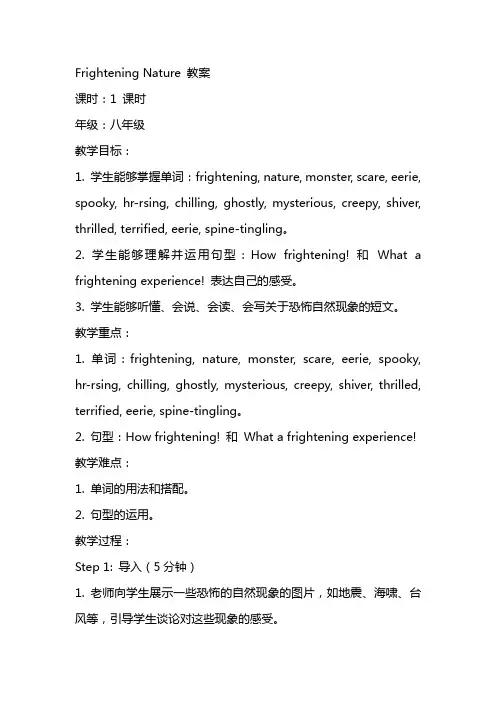
Frightening Nature 教案课时:1 课时年级:八年级教学目标:1. 学生能够掌握单词:frightening, nature, monster, scare, eerie, spooky, hr-rsing, chilling, ghostly, mysterious, creepy, shiver, thrilled, terrified, eerie, spine-tingling。
2. 学生能够理解并运用句型:How frightening! 和What a frightening experience! 表达自己的感受。
3. 学生能够听懂、会说、会读、会写关于恐怖自然现象的短文。
教学重点:1. 单词:frightening, nature, monster, scare, eerie, spooky, hr-rsing, chilling, ghostly, mysterious, creepy, shiver, thrilled, terrified, eerie, spine-tingling。
2. 句型:How frightening! 和What a frightening experience! 教学难点:1. 单词的用法和搭配。
2. 句型的运用。
教学过程:Step 1: 导入(5分钟)1. 老师向学生展示一些恐怖的自然现象的图片,如地震、海啸、台风等,引导学生谈论对这些现象的感受。
2. 学生分享自己的经历或观察到的恐怖自然现象。
Step 2: 新课内容(15分钟)1. 老师讲解单词:frightening, nature, monster, scare, eerie, spooky, hr-rsing, chilling, ghostly, mysterious, creepy, shiver, thrilled, terrified, eerie, spine-tingling。
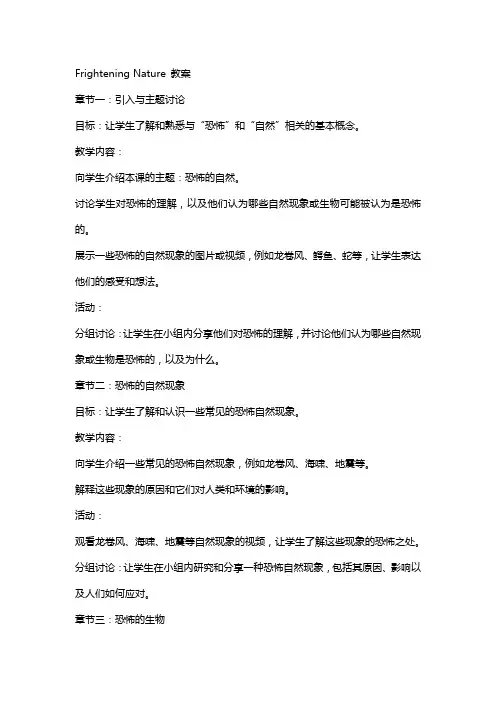
Frightening Nature 教案章节一:引入与主题讨论目标:让学生了解和熟悉与“恐怖”和“自然”相关的基本概念。
教学内容:向学生介绍本课的主题:恐怖的自然。
讨论学生对恐怖的理解,以及他们认为哪些自然现象或生物可能被认为是恐怖的。
展示一些恐怖的自然现象的图片或视频,例如龙卷风、鳄鱼、蛇等,让学生表达他们的感受和想法。
活动:分组讨论:让学生在小组内分享他们对恐怖的理解,并讨论他们认为哪些自然现象或生物是恐怖的,以及为什么。
章节二:恐怖的自然现象目标:让学生了解和认识一些常见的恐怖自然现象。
教学内容:向学生介绍一些常见的恐怖自然现象,例如龙卷风、海啸、地震等。
解释这些现象的原因和它们对人类和环境的影响。
活动:观看龙卷风、海啸、地震等自然现象的视频,让学生了解这些现象的恐怖之处。
分组讨论:让学生在小组内研究和分享一种恐怖自然现象,包括其原因、影响以及人们如何应对。
章节三:恐怖的生物目标:让学生了解和认识一些常见的恐怖生物。
教学内容:向学生介绍一些常见的恐怖生物,例如蜘蛛、蛇、鳄鱼等。
解释这些生物的特点和它们为何被认为是恐怖的。
活动:展示一些恐怖生物的图片或视频,让学生表达他们的感受和想法。
分组讨论:让学生在小组内研究和分享一种恐怖生物,包括其特点、为何被认为是恐怖的以及人们对它们的看法。
章节四:恐怖故事创作目标:培养学生的创造力和想象力,让他们通过创作恐怖故事来表达对恐怖的理解。
教学内容:向学生介绍恐怖故事的基本元素,例如恐怖场景、恐怖生物、紧张氛围等。
指导学生如何创作一个简单的恐怖故事。
活动:让学生分组,每组创作一个恐怖故事。
每组轮流朗读他们创作的恐怖故事,其他学生欣赏并给予反馈。
教学内容:与学生一起回顾本课学到的内容,包括恐怖的自然现象和生物。
讨论学生对恐怖的理解是否有所改变,以及他们对恐怖的感受是否有所增强或减弱。
活动:章节六:恐怖电影分析目标:让学生了解和分析恐怖电影中的元素和技巧。
教学内容:向学生介绍恐怖电影的基本元素,例如恐怖氛围、音效、视觉效果等。
Frightening Nature 教案一、教学目标1. 知识目标:学生能够理解并运用单词和短语:frightening, nature, monster, earthquake, tornado, hurricane, volcano, asteroid, tsunami, solar flare, wildfire, flood, drought, climate change。
学生能够理解并运用句型:What is frightening about nature? How does it affect us? What can we do to protect ourselves?2. 技能目标:学生能够听懂、说出一篇关于自然恐怖现象的短文。
学生能够通过阅读和讨论,了解不同自然恐怖现象的特点和对人类的影响。
学生能够通过小组合作,制定出保护自己和社区的安全计划。
3. 情感目标:学生能够意识到自然恐怖现象的存在,并提高对自然灾害的防范意识。
学生能够理解人类活动对自然环境的影响,并激发保护环境的决心。
二、教学内容1. 单词和短语:frightening, nature, monster, earthquake, tornado, hurricane, volcano, asteroid, tsunami, solar flare, wildfire, flood, drought, climate change。
2. 句型:What is frightening about nature? How does it affect us? What can we do to protect ourselves?三、教学方法1. 交际式教学法:通过小组讨论、角色扮演等方式,让学生积极参与课堂活动,提高口语表达能力。
2. 任务型教学法:通过完成具体任务,如制作安全计划,培养学生的实践能力和团队合作精神。
unit10Frighteningnature全单元教案UNIT 10 (2A)Frightening natureCONTENTS教材分析(ANALYSIS OF THE TEACHING MATERIAL) 1地位与作用 (Status and function) 1教学目标 (Teaching aims) 2课时安排(TEACHING ARRANGEMENT) 2教学计划 (TEACHING PLANS) 3Periods 1 & 2 Warming-up & Reading 3Period 3 Listening(Wb) Speaking & T alking 6Period 4 Integrating skills(Sb) 8Period 5Listening(Wb) Integrating skills & Writing (Wb) 11Period 6 Grammar & Word Study 13附录一背景资料 (BACKGROUND KNOWLEDGE) 16附录二参考网站 (WEBSITES FOR REFERENCE) 18附录三:ARE YOU READY FOR A HURRICANE? 19教材分析(Analysis of the teaching material)1 地位与作用 (Status and function)本单元的中心话题是“恐怖的自然”。
围绕这一话题讨论了台风、火山等自然灾害发生时的现象及带来的影响。
通过各个部分的学习,学生初步了解各种自然灾害及对人类带来的危害,从而增强保护环境和自我保护意识。
“热身”(Warming up) 通过四张图片引出自然现象:火山、台风和彗星及进行科学研究的仪器。
通过师生问答形式,学生能描述自然现象并对台风、火山等自然灾害有初步了解。
根据图式理论,将新学知识与学生已有的知识结合起来,能激活学生已有的图式,有利于新知识的掌握。
高二英语Unit10 Frightening Nature 学习目标课文理解语言现象透视【重点词汇】1.Disaster. [讲解]句中disaster的意思为“灾难;祸害;惨败”,是可数名词。
课文原句: ...,who died in unforgetable disaster.译文:我叔叔死于一场难以忘怀的灾难中。
[例句]1)The flood was the greatest disaster our region had ever experienced.这次洪水是我们这一带从未经历过的特大灾害。
2)The pilot helped to avoid a disaster.领航员帮助避免了一场灾难。
2.Attention. 词义为“注意,专心,留心,关心”。
它可以构成动词短语pay attention to(注意),draw one’s attention(吸引某人的注意), turn one’s attention to(转移某人的注意), attract one’s attention(吸引某人的注意), fix one’s attention on(将注意力集中在),stand at attention (立正站着)catch one’s attention(吸引某人的注意); focus one’s attention on(将注意力集中在)课文原句:On the 24th of August in 79 AD,between two and three in the afternoon my mother drew my uncle's attention to a cloud of unusual size and shape.译文:在公元79年8月24日下午2点至3点,我母亲让我叔叔注意不同寻常形状和大小的云。
[例句]1)Pay special attention to the intonation.要特别注意语调。
Unit 10 Frightening Nature一、教材分析本课是人教社全日制普通高级中学教科书(必修)高中英语第二册上第十单元的第一课时的教学设计。
这一课时里要完成三个小模块的任务:warming up,listening及speaking。
本单元主题为Frightening nature。
作为该单元第一课时,主要是激活学生关于自然灾害的思维,引起学生对自然与人类日常生活关系的思考,并能就自然问题,表达感情、焦虑和畏惧。
二、学生分析自然灾害与人类日常生活关系密切,很容易调动学生的积极性,投入到课堂中来。
但在完成任务时,学生仍有一定难度,尤其是听力部分涉及到美国地图及天气情况介绍。
对美国地理知识了解不多的学生会在完成听力训练任务时有一定难度。
因此在处理教材时,会根据情况有所调整以便降低学生完成任务的难度。
三、设计思路本堂课主要采用任务型教学途径,这种途径强调以应用为动力,以应用为目的,以应用为核心,即为用而学、用中学、学了用的教学途径。
学生带着任务学习,在完成任务的过程中逐渐生成知识,形成技能。
本课将通过任务型教学,努力达到课堂活动目的。
四、教学步骤Teaching content:Unit 10 Frightening Nature: warming up, listening & speaking. Teaching aims:To talk about natural disasters: volcano hurricane and typhoon.To motivate students to get more information about nature.To strengthen students’ ability of liste ning and speaking.To inspire students to express emotion, such as anxiety and fear. Teaching important and difficult points:Make sure students get aware of what our topic is in this unit and know what to say about this topic.Enable students to know something about geography and weather in America.Practice expressing their feelings.Teaching methods:task-based; students-centered; equipment-aided; dialogue. Teaching procedures:Step Ⅰ.Greetings and lead-inBy asking questions like “What is the weather like today?” the teacher can guide the Ss to talk about weather. They can answer it’s fine/ cloudy/ rainy/ snowy. It’s an ordinary day. The weather is usually normal. I’ll show them pictures.In this way, students can brainstorm as many words as they can by describing the pictures. The useful words and phrases to describe weather are as follows: cool and dry air; warm and moist air; showers; thunderstorms; snow; strong winds; storms; hurricane; typhoon; sunny; cloudy; rainy; fine/ nice ……The words may help Ss have a better understanding of the following listening text.Step Ⅱ.Listening一、Listen to the first paragraph of the listening text and answer the following questions: 1. What do we call this type of radio message?2.What are the place and the time that this radio message is for ?Then show them a map of the USA and motivate the Ss to talk about what the weather may be like in different parts of the USA and which areas hurricanes are most likely to hit.二、Listen to the text again and fill in the blanks with information from the text.三、Listen to the text once again and discuss the following questions.1.How should you prepare for the day if you go fishing in the Great Lakes region?2.In which part of the USA should car drivers be careful?3.Which letter would the name for the sixth hurricane in 2005 begin with?4.What happens when a hurricane hits the coast?By answering these questions, Ss may get aware that nature has much to do with our daily life; on the other hand, the fourth question can guide us to talk about bad weather and how we feel about it.Step Ⅲ.SpeakingJust now, we talk about hurricanes and what happens when a hurricane hits the coast. Now, let’s look at some pictures about hurricanes and just think how you’ll feel and behave in such a situation. Student can brainstorm many words and expressions by talking about the hurricane:How terrible! I dare not go out.I think it is very frightening.It’s a frightening thing. I’ll stay outside.I’m frightened/ scared to death when…I get very upset! I think it’s very unpleasant.I’m afraid of…It makes me feel very worried.What’s really scary…He gets into a total panic when…It makes my hair stand on end.What terrifies me…Then listen to a dialogue and practice talking about things like lightning, volcanoes, earthquake snakes, drought, sandstorms and something else. The expressions they brainstorm will be of great help.Ask Ss to work in pair and to act out their dialogues in front of the other Ss. Prepare some models and pictures showing natural disasters or frightening scenes to create an atmosphere.Step Ⅳ.HomeworkWrite a short passage describing something frightening you once experienced. 分析:1.利用多媒体制作课件,加快了课堂的节奏,调动了学生的积极性,使课堂呈现更具直观性。
2023年unit 10 Frightening Nature(人教版高二英语上册教案教学设计)整理Periods 1 2 Warming-up ReadingGoals:1. Learn something about volcano through reading.2. The students can use what they have learned to describe volcanoes.3. The students realize that human beings can overcome any hardship.4. The students will improve the ability to solve problems.Teaching important points:1.Try to master the useful new words expressions in this period.2.Understand the text well.Teaching difficult points:1.How to use the new words expressions correctly.2.To understand the reading materials of similar topics.Teaching aids: a computer, a tape recorder a projectorTeaching proceduresStep 1 Warming upQ1: What’s the weather like today?It’s sunny (rainy, windy, etc).Q2: Do you often care about the weather?Yes. / No, sometimes.Q3: How do you hear about it?On TV. / Over the radio.Q4: Have you ever heard of typhoon?Yes, quite often.Q5: What words can you think of to describe the typhoon weather?heavy wind (blow hard) storm (show a picture of stormy weather.)roaring thunder (also roaring forties: part of the Atlantic Ocean, often very stormy, between latitudes of 40 and 50 degrees south.)Q6: What will you feel in such kind of weather?frightened, scared, terrible, happy (Ask the students why they feel happy? ---- Because typhoon will often release the drought. What’s morethere is enough water, which can be used to make electricity.)Q7: What about the hurricane? Have you ever heard about it?It is something like typhoon.Q8: What about volcano?Q9: Look at the picture. Find out as much as you can to describe it.eg. eruption lavaQ10: How is a volcano formed?1). Show a video about the eruption of a volcano.2). Show a picture of the boiling water kettle, which means the eruption of a volcano is something like the boiling water from the kettle. That is, the rocks is very, very hot and melted to gas and liquid. And they try to get out like the steam and boiling water.Q11: Where is the most possible place that a volcano may erupt?Near the ocean. eg. Fujiyama mountain in Japan.Q12: Do you know how a volcano works, if you do, describe it?Rocks from under the earth becomes hotter and hotter and many things erupted from thevolcano, such as:Gas: vapour, carbon dioxide, nitrogen, sulphur, etc.Solid: bits of rock and volcanic ash, etc.Liquid: lava.Step 2 Pre reading1. Show a picture. Ask the students: What can you see in the picture? (The body of the people, exactly, the body of the people in the town of Pompeii in the southern Italy.----show a picture of the relics of the town of Pompeii.)2. Show another picture. Ask the students to guess what happened in the town of Pompeii? (A volcano erupted suddenly and after 18 hours all were damaged, including the people, animals, plants and the town itself.)Step 3 While readingTask 1 Skim the text and answer the following questions.Q1: What is described in the following passage?The eruption of the volcano called Mount Vesuvius.Q2: When and where did it happen?On the 24th of August in 79 AD in southern Italy.Q3: Who is the writer of the letter?Pliny, the younger.Task 2 Decide whether the following sentences are true or false.1. A volcano erupted on the 24th of August in 79 BC in southern Italy. F2. My uncle planned to save his friend’s wife Rectina. F3. My uncle went to rescue Pompy after saving Rectina. T4. The flames came from the homes of farmers who had left in a panic with the kitchen fires still on. F5. They decided to try the open air instead of staying in the house. T6. It was night when the volcano erupted. FTask 4 Scan the text fill in the following form.Date On the 24th of August in 79 AD in southern Italy. What happened: The eruption of the volcano called Mount Vesuvius.First A cloud of unusual size shape rising from a mountain drew my uncle’s attention and he wanted to see it from closer at hand.Next After receiving a letter from his friend’s wife Rectina, he changed his mind to save her.Then In spite of the danger, he turned back to rescue his friendPompy and help calm down the other people.Finally My uncle wanted to get out of the danger but failed. He was dead.Task 5 Arrange the following statements according to the right order.1. He decided to rescue his friend Pompy.2. Some people watched an unusual cloud rising from a mountain.3. Rectina begged him to save her.4. He ordered a boat made ready.5. Two slaves helped him stand up and immediately he fell down dead.6. He bathed and had dinner.7. A rain of rocks was coming down.2-4-3-1-6-7-5Task 6 Read the text again and explain what the words in bold refer to.it: a cloud of unusual size and shape rising from a mountainthe one: the windthe other: my uncle’s friend Pompytheir: flamesThey: scared peopleLanguage points:1. draw one’s attention to sth. 吸引某人的留意力eg. She drew my attention to a mistake in the report.catch one’s attention; focus one’s attention on; pay attention to; give one’s attention to2. Ash and bits of rock that were burnt black were falling onto the ship now, darker and more, the closer they went.3. urge 督促, 极力主见; 剧烈要求eg. The U.S.A urged Iraq to give up.4. Upon arrival: As soon as he arrived 当…的时候; 一… 就…5. bath n. 洗澡;浴缸bathe v. 洗澡6. He looked more asleep than dead.eg. The pig looks more lovely than stupid.eg. The boy looks more stupid than angry.Step 4 Post readingTask 1 The uncle of the writer was not afraid of what was happening. How do you know? Give three examples that show he had no fear.1. He wrote a report about all he observed during his trip.2. Rescued Pompy, calmed down, bathed and had dinner, sleep, etc.3. Slept after baths and dinner, told the flames came from the homes of farmers who had left in a panic with the kitchen fires still on.Task 2 Further understanding1. How does nature form a danger to people in the world and how can science help reduce that threat?eg. In the summer, with the arrival of typhoon, a rain of storm and flood will come, which will damage a lot of things, including people, animals, and buildings, etc. The factory will also be closed because of it.Ask the students to think as many examples as they can.2. What’s the relation between human beings and nature?We can’t go against nature. We should live in harmony with the nature.3. What should we do to protect the environment that we live in?5R policy.1. Reduce: Reduce the amount of waste by every possible means.eg. Show a picture of a tree; explain to the students that we must reduce the amount of trees that we cut down.2. Reuse: Reuse the useful things before getting rid of them.eg. Show a picture of a coat; explain to the students that when our coat is not suitable for us to wear, we can give it to our brothers, sisters or give it to the Project Hope.3. Recycle: Recycle the waste things if possible.eg. Show a picture of a cola can; explain to the students that after drinking the cola, the cans left can be collected together and melt them to make new cans.4. Recover: Make use of good parts while getting rid of the bad ones.eg. Show a picture of a watermelon; explain to the students that if part of the watermelon is rotten, we can cut it out and eat the good parts.5. Repair: Repair the broken things.eg. Show a picture of a chair; explain to the students that if one leg of a chair is broken, we can repair it and use it again.Homework:1. (in the first period)Find out some sentences you enjoy most, try to recite them as possible as you can.2. (in the second period) Finish Exercise 2 at Page 77 in SB..Period 3 Listening(Wb) Speaking TalkingGoals:1) Understand the listening text in the workbook.2) The Ss can express emotion, anxiety and fear properly.3) Know more about typhoon.Teaching important points:To master the useful new words and expressions.Teaching difficult points:How to use what the students have learned to describe a nature disaster.Teaching aids: a computer, a projector a tape recorderStep1 RevisionQuestions: 1 What kinds of disasters does nature give us?2 What kinds of disasters does man give us?Step2 Pre-listeningPage 144,Listening. Look at the picture. Discuss Exercise1 with the students.Step3 ListeningPlay the tape for the students to do Exercises2-4. Then ask: What happened in the typhoon Linda talked about?Step4 Lead-inPage74,Speaking.Get the students to read the dialogue to find out the answers to the following questions:1 What happened in the typhoon?2 What else do you know will happen in a typhoon?3 What was people’s emotion?4 What do you think happens in a hurricane, a volcano, an earthquake, SARS and bird flu?Step5 SpeakingGive the students some pictures. Get them to make a similar dialogue. Tell their partners whether these things or situations frightenthem and explain why. Also, talk about people’s emotion in these situations and how they would behave. Get them to make with the help of the useful expressions.Model:A: Have you been in a situation that frightens you?B: Yes. It was last summer. I spent my summer vacation in my hometown, a small village in a mountainous district. One day, I went hiking with my cousin. On our way home, we met a cobra.A: Were you frightened when you saw it?B: Very! It made my hair stand on end. My cousin was too frightened to move at that time, too. Because we both saw on TV that the poison of a cobra can kill a person easily.A: What happened next?B: Fortunately it didn’t see us. We acted just as the TV programme told us. At last, it went by. The distance between the cobra and us was only three metres or so.A: How terrible!Step6 Pre-talkingAsk: What do you need to do when you are trapped in a typhoon?Get the students to read the dialogue at Page144, Talking betweenXiaosong and David to find out what Xiaosong suggests in case of typhoon.Step7 TalkingGet the students to read the roll cards and make similar dialogues.Step8 HomeworkMake a dialogue with your partner about a disaster. It should include the following:1) What was it like?2) What happened?3) What was people’s emotion and what about yours?4) What safety measures should be taken?Period 4 Integrating skills(Sb)Teaching Aims:1. Learn the text “typhoon” and master the detailed information in it.2. Learn useful words and expressions3. Write a passage about how the story will end.Teaching important points:1. To train Ss’ reading skills and writing skills2. To master the usages of the new words and expression of this period.Teaching difficult points:1. To write a passage about terrible weather---- typhoon2. To understand the difficult words, phrases and sentencesTeaching methods:1. Fast reading and careful reading: to get the Ss to grasp the detailed information2. Writing practice: to get the Ss to learn how to describe something terrible3. Pair work or group work: to get the Ss to be active in classTeaching Aids:a computer, a projector, a tape recorder ( if the teacher wants )Teaching procedures:Step 1 Teaching Revision1.Check the homework2.Retell the story ( if the teacher likes )3.Review the words and expression for talking about weather.(This activity aims to review the words and motivate the Ss. In this way, the topic will be turned to typhoon.)Step 2 Lead inT: In the last few periods, we deal with a letter about volcano. It is a terrible nature disaster. This summer our hometown also experience a terrible disaster----- typhoon, one called Yunan. It caused great damage, isn’t it? Can you describe it? ( Ss: …. )T: If it happens in USA, what do people call? (A hurricane )In fact, a typhoon is the same thing as a hurricane except the place where they form. Before we deal with the detailed information, let’s watch a short video to experience the story wind again and here are two questions for you.1. What does the hurricane bring in?2. How long will it usually last?(Ss watch the video and give the answers. If it is necessary, play it twice.)Step 3 Pre-readingT: We know typhoons can cause great damage or even deaths. In order to reduce the loss and protect ourselves, we have to learn more about it. Then what else do you know about the typhoon? Tell us what you know, please! First talk with your partner and then tell the whole class what you have discussed.( pair work for two minutes and then one or two Ss report )(This activity is to motivate the Ss to talk in English and cooperate well with each other.)( Then the teacher introduce the background information )T: Now, Let’s look at the diagram. We’ll know what is typhoon. Typhoon is a kind of tropical cyclone. It’s the atmospheric whirlpool formed on the warm tropical ocean and the area of low pressure. Winds are produced because the pressure of the air is different in different places. Air flows from a region of high pressure to a region of low pressure, causing a wind. The low pressure center is the eye of the storm. And tropical cyclone is the general name of tropical depression, tropical storm, severe tropical storm and typhoon or hurricane. In USA, people don’t use the name of severe tropical storm and typhoon. Instead, people use the name---- hurricane. All over the world, people name these tropical cyclones according to their strongest speed of wind. Can you guess how fast a typhoon can move? (Show the form to the Ss)(Look at the form --- tropical cyclone naming conventions )(Then the teacher shows the map of the world, ask Ss to tell the difference between typhoon and hurricane.)Step 4 While readingFast reading: skim the passage and try to get the general idea of the text. ( Ss answer the main elements of a story: who, when, where, how)Careful reading: Ss finish two tasks after reading.Task1.Scan the passage and find the answer to the following questions.1. Where did the ship meet the typhoon?2. What was the weather at first?3. Why did the capital say that it looked as if a typhoon was coming on?4. Where were they when the full force of the hurricane struck the ship?5. What should they do in such terrible weather?6. What does the sentence “ Another one like this, and that’s the last of her” mean?7. Why did the capital strike a match? What did he see?Task2. Try to explain the difficult sentence in bold in English.1. It was fine, for there was no wind and the heat was close.2. Because he observed the barometer fell steadily and he knew thata terrible storm would come soon.3. When the hurricane struck the ship with full force, they were all on the bridge.4. They could only move the ship over the high sea and into the very eye of the wind.5. It was the lowest reading he had ever seen in his life(If Ss couldn’t understand the sentences, allow them to discuss with their partner.)Deal with language points after that.1. on board = in or on ( a ship, an aircraft or public vehicle)eg. 1) Have the passengers gone on board yet?2) 一上船,我总想吐。
《Frightening nature》典型教学设计研究
【课程分析】本单元的中心话题是“自然灾害”,具体涉及火山爆发、飓风、台风等。
本节课要完成warming up(热身)、listening (听力)、speaking (口语)的内容。
通过这三部分的学习,激活了学生关于自然灾害的思维,将学生的注意力引向学习本单元所需的相关词汇,通过听和说,展开有意义的交际操练,达到熟练掌握有关的词汇和句型的目的,充分调动已有的语言知识,并启发他们学习新知识的动机。
本节课的内容为这一单元的阅读学习做了铺垫,使学生更好的理解课文内容,让学生体会到自然灾害带给人们的焦虑、恐惧和痛苦。
因此本课的教学结合实际——汶川地震,引出自然灾害,会让学生深深地感受到自然灾害的切肤之痛,也会对本课的内容有一个更深刻的理解。
【学情分析】学生在上一节课《saving the earth》中已经学过关于自然,生态和环境的知识,因此学生已经对自然环境的词汇有了一定的积累,但是本课涉及的有关自然灾害的内容,学生交际起来还有难度。
首先,有关自然灾害的词汇还不认识;其次,运用所学词汇来表达个人对自然灾害的认识及思考。
总之,要想达到学有所用的目的,需要学生有较好的英语基础,本班的学生基础好的学生较多一些,所以在分组时注意把好中差平均分配,把关系融洽的分配在一起,以便更好的交流,运用所学知识,巩固新知,充分调动全体学生的积极性。
【教学流程】
一、情境创设,整体感知
1.创设情境,导入新课【课件投影】认真观看影像资料关注与地震有关的英语词汇,这是2008年5月12日的汶川地震的悲惨场景。
然后认真思考像地震一样的自然灾害还有哪些?小组进行讨论之后,自由发言。
(设计意图:通过学生熟知的影像材料,吸引学生的注意力,调动学生的学习积极性,自然过渡到本节课的教学内容。
)
(简要实录:教师在学生看完地震的影音材料时,看到学生的表情都很悲伤,对地震这个英语词汇都铭刻在心,当老师问道还有哪些自然灾害时,学生积极讨论,之后又都积极主动的介绍了一些其它的自然灾害。
)
2.图片展示,学习单词【课件投影】请观察这4张图片都是哪一种自然灾害(每张图片的下方写出它的英文,) eruption(火山爆发)、hurricane(飓风)、typhoon(台风)、flood(洪水)。
学生反复读,读准字音。
(设计意图:给学生一个直观的表象信息,让他们一目了然,通过画面争强学生对单词的理解与记忆。
)
(简要实录:学生看到他熟悉的画面,抢着要读出他所熟悉的画面的英文单词,使单词教学不像以往的单调模式,学生对他不再陌生,学习的热情大大提高。
)
【课件投影】观察图片中人物的表情,用你们学过的英语词汇表
达出来,小组讨论然后自由发言。
(设计意图:以此引出课件显示的新单词,由旧知识引出新单词,学生读准字音,通过直观的表情,加上自然灾害的背景,学生很容易的会想到有关恐惧,悲伤的词汇,由旧代新,增加了对新知的理解和记忆。
)
(简要实录:学生们大都想到了fear(害怕)sorrow(伤心)frighten(恐惧)等几个词,当我用投影打出了新单词frightening (惊恐的),threat(恐吓),terrify(使恐惧)时,好像学生有了前面的铺垫,很容易就理解了这几个词,而且读音也很准确。
)
二、探究新知,进行交流
1.口语交流,热身活动【课件投影】与小组成员共同讨论以下2个问题之后自由发言。
(1)do you often hear about these things in newspapers or on tv? give examples.(你经常在报纸和电视上看到这些事吗?举例)
(2)how does nature form a danger to people in the world and how can science help reduce that threat?(世界上的人是怎样应对自然灾害的,科学是怎样帮助减少恐惧的?)(设计意图:通过讨论,巩固新单词,把新知运用于口语交流中,引起对自然灾害的进一步思考。
)
(简要实录:学生的回答比较正确,但不是很全面,老师给补充。
)【课件投影】小组活动,深入探究。
4人一组,谈论这些自然学
科与日常生活的关系,其中一人负责记录谈论的内容,然后向大家汇报,各小组发言人陈述本组讨论结果。
(设计意图:让学生都互动起来,让好的带动差的,全员参与,活跃课堂气氛,进一步地巩固新知。
)
(简要实录:发言人老师选的都是较差的学生,这些学生在好学生的带动下表述不是很完整,但也基本回答正确,老师在给予鼓励的同时,又补充了答语,让学生增加了学习的信心。
)
2.听力训练,巩固新知【课件投影】认真听录音,记录你所听到的与天气预报有关的词汇。
(设计意图:把新知运用到生活中,进一步加强知识的实效性。
)(简要实录:学生根据已有的知识,听力的补充,还有生活的经验,总结了有关天气预报的词汇,例如:wind(风),temperature (温度),rain (雨), snow(雪),typhoon(台风),warm (暖和),cold (寒冷)…..有几个词没有指望学生总结出来,但是仍有几个学生的答案出人意料的完整。
)
三、迁移深化,提高能力
1.【课件投影】阅读下面的对话,分组讨论台风所带来的影响然后自由发言 a:are there any typhoons in the area where you live?(你居住的地方有台风吗?)
b: there are , sometimes, but not very many.(有时,不很多)
a: yes. i remember one that happened last summer. it was
a bit scary, but i wasn’t really afraid . i saw the tops of trees moving in circles, and sand and pieces of wood were swept up into the air . what about you ? have you ever experienced one?(是的,我记得去年夏天发生过一次,有点恐怖,但我不害怕。
我看到树顶被风吹得东倒西歪,沙子木块都被卷到空中。
你呢?你经历过吗?)
a: no ,but i know about a friend whose parents lived in guangdong. one day a real typhoon hit their village. it was very frightening and destroyed most of the houses. my friend said he was scared to death . some people got into a total panic, when the typhoon pulled the roofs off their houses and cars went up in the air.(没有,可是,我知道我的一个朋友,他的父母住在广东。
一天,一场台风袭击了他们的村子。
它很恐怖而且毁坏了很多房屋。
我的朋友怕的要死。
台风把他们的房顶掀开了,汽车被卷入空中。
)
b: how terrible !(多可怕呀!)
a:yeah, man . now that kind of thing would really frighten me .(是的,这样的事太吓人了。
)
【课件投影】根据同学们的回答,小组之间运用本课的单词和句子自如表达对自然灾害的认识进行讨论,并派小组代表读给同学们听。
(设计意图:这一部分重在培养学生在生活中的英语交际能力,
学习运用语言的能力,更好的促进学生的口语能力。
)
【课后反思】同以往的教学相比,本节课精心设计任务,每一个教学任务环环相扣,紧密联系,由易到难。
创设情境,层层深入,使学生在明确的导向性信息的引导下,本着“从大处着眼,小处入手”的学习方式,本着“化抽象为具体”的原则,教学内容不断深化。
从影音教学导入单词,再由单词教学递进到句子的表达,再由词汇和句子,导入到对话。
本着调动学生积极参与的原则,真正做到把课堂还给学生,充分调动学生的的“七动”,把学生分成小组的形式,以优带差,让每一个学生都有尝试的机会,让同学之间互动起来,在对话的编写与交流中,出乎我的意料的是,站起来发言的竟是平时讲课时一言不发的,我真的感到震惊,也很愧疚,是我误导了学生吗?真的是很感谢诱思探究,它就像一盏指路明灯,照亮我的教学之路,原本在教学中感到疲惫的我,突然感到如释重负,原本对我的学生心灰意冷的我,突然感到他们的可爱,原来不是学生不会学,是我教法不得当,不是学生差,是老师不相信学生。
初探诱思探究,仍有不足之处,对学生的了解不够全面,学生的答案让我有很多意外。
因此,今后的教学应该是考虑全面,更贴近学生的感受,以学生的角度展开教学,使学生爱学,老师愉快。